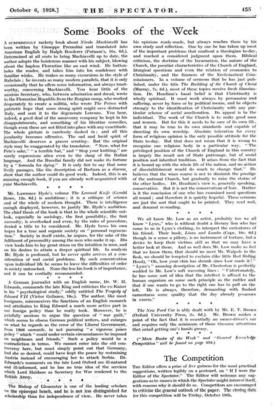Some Books of the Week
A SURPRISINGLY rackety book about Nicolo Machiavelli has been written by Giuseppe Prezzolini and translated -into American English by Ralph Roederer (Putnam's, 10s. 6d.). Determined at all costs to bring Machiavelli up to date, the author adopts the boisterous manner with his subject, blowing about the hapless Florentine like an east wind. He button- holes the res." der; and takes him into his confidence with familiar winks. He makes so many excursions in the style of Ribelais ; he invents so many modern parallels, that it is only occasionally that he offers some information, not always trust- worthy, concerning Machiavelli. You hear little of the anxious Secretary, who, between admiration and dread, wrote to the Florentine Republic from the Borgian camp, who worked desperately to create a militia, who wrote The Prince with patriotic hope that some strong spirit might save distracted Italy, and sent it to the degenerate Lorenzo. You hear, indeed, a good deal of the unsavoury company he kept in his disappointments, and something of , his libertine comedies, though even these are not fitted into place with any exactitude. The whole picture is carelessly dashed in ; and all this jocularity becomes offensive. The sad and lucid spirit of Machiavelli deserves a graver scrutiny.. But the original style may be exaggerated by the translator. " Now, what for Pete's sake," " a terrible bat," and " Stop your knitting," are surely expressions alien even to the slang of the Italian language. And the Rucellai family did not make its fortune by a " formula for dying." It is only fair to say that some lively passages, like the description of Barbara as a disease, show that the author could do good work. Indeed, this is an amusing enough book, if you are already well acquainted with
your Machiavelli. * * *






















































 Previous page
Previous page